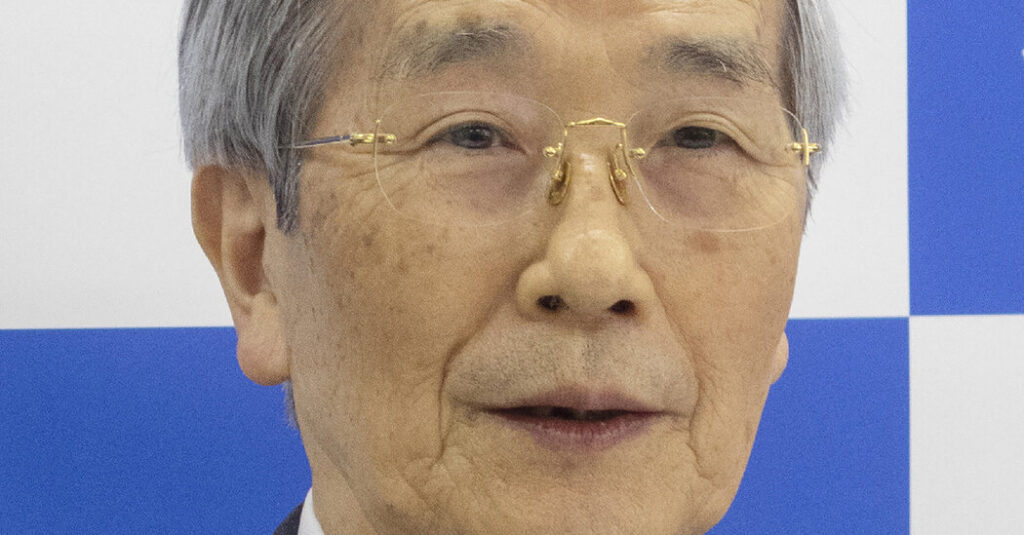Akira Endo, a Japanese biochemist whose research on fungi paved the way for a widely prescribed drug to lower a type of cholesterol that contributes to heart disease, died on June 5 at the age of 90.
The news was confirmed in a statement by Kazuhiro Chiba, president of Tokyo University of Agriculture and Technology, where Dr. Endo is an honorary professor. The statement did not specify the cause or location of his death.
Cholesterol is mainly produced by the liver and has important functions in the body. It is also a leading cause of coronary artery disease, a leading cause of death in the United States, Japan, and many other countries.
In the early 1970s, Dr. Endo grew fungi in an attempt to find a natural substance that could block a key enzyme in the cholesterol production process. Some scientists worry that doing so could threaten cholesterol’s positive functions.
But by 1980, Dr. Endo’s team discovered that a cholesterol-lowering drug, a statin, could lower levels of LDL (low-density lipoprotein), or “bad” cholesterol, in the blood. By 1987, after other researchers in the field published more studies on statins, Merck began producing the first licensed statin.
Such drugs have proven effective in reducing the risk of cardiovascular disease and are taken by millions of people in the United States and elsewhere for high LDL cholesterol.
Akira Endo was born on November 14, 1933, in Yurihonjo City, a mountainous area near the Sea of Japan. His parents were farmers, and he developed an interest in mushrooms and molds, which influenced his work as a scientist.
He worked in the rice fields during the day and went to high school at night despite his parents’ objections. Kozo Sasada, a spokesman for the Akiken Endo Association, an organization honoring Dr. Endo’s legacy, said he was inspired in part by a desire to help farmers combat agricultural pests.
Dr. Endo said his career was also inspired by a biography he read of Scottish biologist Sir Alexander Fleming, who discovered penicillin in the 1920s.
“For me, Fleming was a hero,” Dr. Endo told Japanese medical publisher Igaku-Shoin in 2014. “As a child, I dreamed of becoming a doctor, but then realized a new horizon by not being a doctor. People can also save people’s lives.
After studying agriculture at Tohoku University, he joined the Japanese pharmaceutical company Sankyo in the late 1950s. His first assignment was to produce enzymes for juice and wine at a factory in Tokyo.
He later told M3, a website for Japanese medical professionals, that he developed a more effective mold culture method by applying his childhood methods of making miso and kimchi. His reward was a promotion to the company’s microbiology and chemistry laboratories.
In the 1960s, he received a PhD in biochemistry from Northeastern University. He also lived in New York City for several years as a researcher at the Albert Einstein College of Medicine.
He later told M3 that at the time he wanted to invent a cure for stroke, a leading cause of death in Japan. Strokes killed his father and grandparents.
“But when I went to the United States, I learned there were a lot of heart disease cases there, so I switched,” he said.
Back at Sankyo, he grew more than 6,000 species of fungi in the early 1970s in an effort to find a natural substance that could block a key enzyme in the cholesterol production process.
“I didn’t know anything about it except mold, so I decided to look for it in mold,” he said.
He finally found what he was looking for: a strain of Penicillium, or blue mold, that reduced levels of an enzyme that cells in chickens need to make LDL cholesterol.
According to Akiken Endo, Dr. Endo’s survivors include his wife Ori, son Shu and daughter Chiga. Complete information about the survivors was not immediately available.
After leaving Sankyo Corporation in the late 1970s, Dr. Endo served as a professor at various universities in Japan and as president of the Japanese pharmaceutical company Biopharm Research Laboratories. In 2008, he received the Lasker Award for his medical research, a prestigious honor awarded by a New York foundation.
Dr. Endo said in a 2014 interview that he had tried to build his career around solving a global problem that was not unique to Japan. He compares his job to climbing a mountain much higher than Mount Takao in Tokyo.
“If I were to climb a mountain,” he said, “Everest would be better.”
mayor of orlando Gina Kolata contributed reporting.

